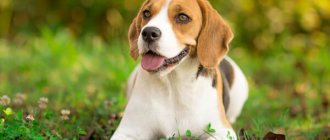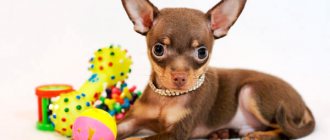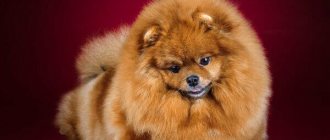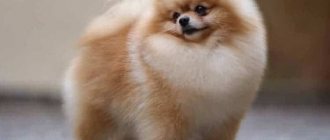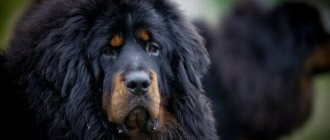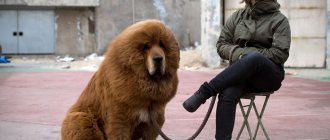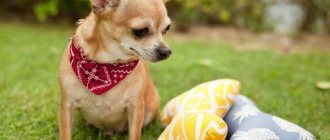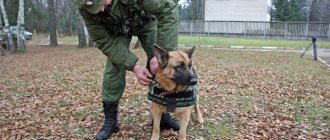| Breed name: | Shiba Inu |
| Breed name in English: | Shiba inu |
| Country of origin: | Japan |
| Type: | A small dog |
| Weight: | 7-13 kilograms |
| Height (height at withers): | 35-42 centimeter |
| Color | Black and tan, red sesame, cream, black sesame, sesame, red |
| Wool length | Short |
| Lifespan: | 12-15 years |
| Character | Charming, funny, fearless, loyal, smart, sweet |
| Number of puppies (average): | 2-3 |
| Price of puppies: | 500-3500$ |
Description
The Shiba Inu is a hunting dog bred in Japan. Dogs are considered a national treasure and symbol of this country. An animal's smile wins many hearts. The Shiba Inu is a dog with a lively personality and playful nature. This is an active animal that loves to travel, walk and run with its owner. Pets are independent and brave, making them difficult to train. The dogs are also very clean and spend a lot of time grooming themselves.
Appearance
— Advertising —
The standard specifies the following breed parameters.
Head
The head is triangular in shape. The size of the skull is moderate and proportional to the body. The forehead is wide and flat, with a slight furrow. The lower jaw protrudes slightly forward. The length of the muzzle makes up 40 percent of the total length of the head. Scissor bite. The mouth contains strong, white, even teeth.
— Advertising —
The eyes are deep-set and inclined towards the outer base of the ear. The iris is dark. Eye color – brown, black edging. There are other eye colors - black, gray, light yellow and light blue. However, they are not recognized as a standard.
The ears are triangular in shape, set far apart and tilted straight forward. Nose is black.
Neck, back line and body
The neck is strong and of medium length. The back line is straight, level with the base of the tail. The body is dry and muscular. The lower back is strong. The tail is thick and powerful, set high. It is located at the level of the back in a crescent or ring-shaped position.
Limbs
The elbows are located close to the body. The front legs and feet are straight and parallel. The paws are “cat-like”, with well-arched toes that fit tightly together. The hind legs are strong. Strong hock joint.
The Japanese Shiba Inu dog has a double fluffy coat. The outer coat is hard, smooth and straight, the undercoat is soft and thick. The coat color and pattern can be of the following varieties:
- Black with red splashes.
- Sesame (sesame) red.
- Cream.
- Sesame black.
- Sesame.
- Ginger.
- Brindle.
- Albino.
Description of the breed
Shiba Inus are one of the smallest Japanese dogs with a strong, muscular body and toned abdomen.
If we talk about the size of the Shiba Inu, then the representatives of this breed have pronounced sexual dimorphism. The height of adult males is 38-41 cm and weighs 10-13 kg; females grow at the withers to 35-38 cm and weigh 7-9 kg .
They have a wide head with a pronounced transition from the forehead to the muzzle, slightly slanted almond-shaped eyes of brown color and triangular erect ears. The limbs are strong, the tail is thick, set high.
Representatives of this breed have a three-layer coat: at first the coat is longer and coarser, then shorter and softer, and at the end there is a soft undercoat..
There are quite a few color options: red, black and tan, sesame, black sesame, red sesame, sesame, brindle, white.
The peculiarity of the Shiba Inu lies in their unique facial expressions: these dogs can smile and express many other emotions.
Pros and cons of a dog
You may fall in love with this smiling dog from the first minute. But before you make such a friend, carefully study his positive and negative sides.
Characteristics of advantages:
- These are energetic and active individuals.
- Dogs have high intelligence, so they are easy to train.
- Pets are easy to care for.
- Dogs have almost no salivation.
- They are not prone to sudden weight gain.
- The dog has excellent security qualities: he always protects his owner.
- They are suitable for first-time owners.
- This is a relatively healthy breed.
- Pets are not allergic.
Characteristics of minuses:
- The animal is very stubborn and independent.
- The dog has a high degree of shedding.
- They may run away from home.
- Pets do not get along well with cats and other dogs.
- An animal will feel better in a house than in an apartment.
- If an individual is not socialized from an early age, then it will be overly suspicious of strangers.
Pet character
Shiba Inus have a difficult character , which not everyone can cope with .
These dogs are stubborn and independent, which can seriously complicate the process of education and training - if the pet does not want to do something, then it is almost impossible to persuade or force it.
To people unfamiliar with this breed, it may seem that Shiba Inus are gloomy, unsociable dogs that prefer to always be alone. This is not entirely true.
They really need peace and a place where they can hide from prying eyes, but at the same time they are devoted to their owner and love him, they are just not prone to strong displays of emotions.
Only a person with a strong, strong-willed character can become a master for a Shiba Inu, in whom he will see the leader of the pack, a leader.
At the same time, it is necessary to show the pet that he is not the main one in the house as early as possible, but in such a way as not to belittle his dignity: Shiba Inu only accept communication on equal terms and will not obey.
CAREFULLY!
Due to the preserved instincts used by these dogs in hunting, Shiba Inu are quite aggressive towards other animals and people; only early socialization can change this.
Representatives of this breed are good watchmen and security guards, they are active and hardy and will become good companions for people leading an active lifestyle.
History of the origin of the breed
The description of the breed says that the Shiba Inu is not only the smallest of the Japanese Spitz, but also the oldest. For example, excavations have shown that this breed lived in the Land of the Rising Sun around 7000 BC.
It is controversial whether the breed arrived in Japan from North Asia or Korea. But most experts agree that the Shiba Inu descended from dogs that arrived in Japan during the first or second major human migration. This means that the breed has been present in the country for between 2,300 and 10,000 years. According to National Geographic, Shibs are genetically similar to wolves. This indicates that it is one of the oldest domesticated breeds.
External influences had no effect on Japan for centuries. This is due to the fact that the country was closed, so the dogs were not crossed. That all changed in 1854 when American naval officer Admiral Perry arrived with warships and forced Japan to reenter the world community. Foreigners exported other breeds to Japan and mating of different individuals began. The original Shiba Inu began to disappear.
Rural areas still maintained the integrity of the species as they had less access to foreign dogs.
Inu is definitely a Japanese word. But where the word "shiba" came from is still debated. Shiba is the Japanese name for brushwood. This is a certain vegetation that was common in areas where dogs hunted.
It has also been suggested that "shiba" could mean "small" in an older dialect. Therefore, the breed was named after its size. Whatever its origins, the name "Shiba Inu" was officially coined in Japan in the 1920s.
In 1928, Dr. Hiroyo Saito founded the Nihon Ken Hozonkai (Association for the Preservation of the Japanese Dog). In 1936, the association managed to achieve the declaration of the species as a Japanese national monument.
Unfortunately, many individuals died during World War II as a result of bombing. After the war, breeding programs were reinstated. They used Shiba Inus that survived in remote rural areas.
It is known that the first Shiba Inu was brought to the United States in 1954. He arrived with a military family who were returning from Japan.
The pet's first known American litter was produced in 1979. Many people believe that this year the animal established itself in America. However, it was not until 1992 that the breed received full recognition by the American Kennel Club.
Characteristics of the Shiba Inu breed
Its unusual appearance, comparable to that of a fox, has captivated many breeders.
In 1992, the breed was officially registered by the largest American associations AKC and UKC.
Shiba Inus themselves are very active and friendly dogs, but to achieve this, you need to devote a lot of effort to training them.
According to the reviews of Shiba Inu owners who managed to properly raise this dog, we can say that a trained dog of this breed is an ideal companion, which is distinguished by unrealistic intelligence and intelligence.
It is recommended that only experienced dog lovers, or better yet professional dog handlers, get a Shiba Inu puppy, so that owning a dog of this breed will be nothing but a joy.
Character of the Shiba Inu. Very often, Shiba Inu, by character, are compared to cats. The similarity with cats is manifested in their independence and love of personal space.
Dogs of this breed do not show excessive emotionality, but, on the contrary, appear restrained and persistent.
Properly trained adult dogs quickly understand what discipline is and strictly follow it.
Thanks to its excellent intelligence, the dog easily understands the owner’s requirements and easily adopts his attitude.
The excellent intelligence of the Shiba Inu has a downside: if their mood and opinion at the moment are not similar to the mood of the owner, then they will do as they need, ignoring requests from the owner.
Punishing a dog for failure to comply is useless; it will not understand the essence of the punishment, since it will believe that it did everything right.
That is why it is recommended exclusively for experienced people to own this breed of dog.
But, despite the occasional stubbornness, the Shiba Inu loves its owner very much, since it generally does not recognize other people as equals.
Socialization of the Shiba Inu. When studying reviews about the Shiba Inu dog, you can often notice references to the mandatory need to socialize a dog of this breed. If you miss the moment of socialization, the dog will cause a lot of trouble for the owner, since it will see a threat in everything around it.
These dogs themselves are not playful; they will not interact with animals or people for the purpose of entertainment.
Hunting genes have endowed these dogs with great endurance, strength, and a supply of energy, which must be compensated for in the form of active walks, preferably with some kind of physical activity.
Even with a properly organized socialization process, Shiba Inu dogs will not become affectionate little animals, they will always be on the alert, distrustful of strangers, therefore, dogs of this breed are bred as guards who will not allow strangers to enter the territory.
The Japanese compare raising a Shiba Inu to origami, since both require maximum concentration, perseverance, and patience, which not everyone can do.
Maintenance and care
There are some things you need to know:
- Shiba is incredibly energetic and muscular. Therefore, pets need physical activity and walks. When walking, you will need a secure harness that will not choke your dog. It should be made of durable material, with a neck circumference of 22-27 cm. Avoid dangerous retractable leashes.
- Sibs are smart dogs. You should stimulate their mental abilities periodically. Keep them busy for long periods of time or give the dogs a goal.
- Chewing is a great way for your high-energy Shih to burn off energy. Give her tasty treats that take a long time to chew.
- The pet will play a lot, so it needs its own place to rest. The place where he sleeps should be secluded and comfortable. Periodically change and wash your dog's blanket or cape.
- Sometimes pets are too active. To protect your home from destruction, purchase or make a playpen.
- Feed your dogs high-quality, varied, balanced food.
- Brush your friend periodically. Healthy wool is light, airy, and has a natural shine. Don't cut your pet's hair. Only trimming the mustache and pads of the feet is allowed.
- Bathe your pet as needed. Usually once every 3 or 4 months is sufficient. Choose a special shampoo or natural soap. They should smell nice, not irritate the skin and not cause shedding.
- Check your pet's claws about once every two months. If they don't fade naturally, cut them at home. Use a special nail clipper. If you are afraid to do this, then contact your veterinarian's office.
- In winter, buy your baby a pair of overalls for walking.
Nutrition
Owners know that the breed is very independent and prone to bouts of “activity.” Dogs that do not receive adequate nutrition may become lethargic and anxious due to lack of nutrients. The right food supports their brain and motor functions.
What to feed your Shiba Inu?
Be careful about how much and what you feed your Great Dane.
The main necessary substances for the breed:
- Protein. It contains amino acids that are essential for creating healthy muscles, tissues and cells. Protein, found in proteins, helps with development during puppyhood and adulthood. The ideal source of protein for the species is whole animal meat.
- Fiber is needed for two main purposes. It helps produce the energy needed to stay active and also promotes a healthy digestive system.
- Carbohydrates. They are a source of quick energy. Large amounts of carbohydrates can be harmful to your pet. High-quality dog food formulas already take care of the ratio of protein to fat and carbohydrates. Therefore, you just need to make sure that you follow the feeding instructions.
- Omega 3 and 6 fatty acids and vitamins. They are important components that contribute to the health of your pet's skin and coat. The coat will shine when the dog gets enough Omega 3 and 6.
- Fat. It is needed to process nutrients and produce hormones. Contrary to popular belief, fat does not cause weight gain. Rather, it helps provide sustained energy so your pup can enjoy walks and play without becoming prematurely tired. If you notice that your friend is showing signs of lethargy, he may not be getting enough fat or other nutrients in his diet. Discuss these symptoms with your veterinarian.
How much to feed your Shiba Inu?
All dogs have approximately the same nutritional needs. However, there are differences in energy needs depending on the age, gender and activity level of your pet.
The easiest way to determine how much to feed your pet is to follow the recommendations on the food package. The problem is that these recommendations may not take into account your pet's activity level. If you want to be more precise, you can calculate his actual calorie needs.
The average energy requirement for an adult is about 30 calories per 0.45 kilogram.
Keep in mind that small pets have a very fast metabolism, while larger pets have a slower one. The Inu falls into the first of these categories, having a maximum weight of about 11 kilograms. Animals this size typically require more calories because their daily energy expenditure is higher. Therefore, they need 35 or 40 calories per 0.45 kilograms. This gives a range of 595 to 1000 calories per day, depending on the size of the individual.
Usually the animal eats well. But if your dog refuses to eat for a day or more, contact your veterinarian immediately.
Shiba Inu - reviews
- + Leave a review
Leave a review Reset
Igor Tkachuk
https://otzovik.com/review_3086807.html
The smartest dog I have ever seen, with good manners, practically does not bark, runs fast and actively accepts people near the owner as his own. Once I had to put him in his place, he got a little arrogant) In general, this breed is famous for its wild devotion to its owner, who is only one for him! Every morning he licks his nose, thereby waking him up)) He gets along with the cat, despite many horror stories on this topic, it all depends on how you raise him, by the way, take Shiba out to people more often, he needs company so that he grows up friendly. Such friends to everyone)
Ksuha boss
https://otzovik.com/review_4539291.html
Hello to all lovers of shaggy friends!!! We purchased this miracle two years ago, we thought for a very long time about the breed, the size, well, about everything. We arrived at the nursery, spent a long time choosing, and found this beauty. He was sitting so small, alone in a cage. As they explained to us, it was a culling (one tooth was missing), that is, it is not suitable for exhibitions and other things. Well, we just needed a dog, and with such kind eyes, this little face!!! In general, we couldn’t resist and bought it. The price was cheaper than the others, due to the fact that the rejection cost us 50,000 thousand rubles.
Well, in general, this beauty has been living with us for a long time, we don’t regret one bit that we chose it! Smart, affectionate, funny. Have you ever heard about a smiling dog, this is about him, a smile from ear to ear. He also loves to talk and makes such interesting sounds. The only problem we have is food! Allergic to everything! Whatever he doesn’t eat, he immediately itches, so he eats only dry food. In general, if you decide to buy yourself such a friend, I recommend it, you won’t regret it! Good luck to you, love animals, and they will repay you in kind.
LexNova
https://otzovik.com/review_8716922.html
What I mean is special - love for the owner is not unconditional, like other dogs, who vitally need human love, and for this they are ready to do anything, you need to establish special contact with your dog, the reason lies in a low social instinct and possibly a high intelligence))). You can’t buy a Shiba with cheap baby talk, he should be respected and taken into account like other family members, so this breed is unlikely to suit authoritarian individuals, but if you don’t consider yourself the king of nature and are capable of mutual respect with a weaker and more dependent creature, the Shiba will appreciate it and will become your best friend. Of course, this is a small dog and you can intimidate it to get your way, but in this case, it will be lost as a friend. Of course, a Shiba can sit on your neck, if you are an overly soft person, strictness is necessary, calm, adequate severity and perseverance and nothing more, then the Shiba will understand you).
The dog is very active, tireless and in our case hellishly annoying, he needs to control everything, see everything that is happening and participate in everything, it is sometimes tiring, but overall it’s cool))). Very observant, curious and savvy. The only thing that upsets me is that the dog is on a leash, there is no trust in him whatsoever, he will rush off into the fields and not even turn around, while other dogs are afraid of losing sight of their owner. While other owners are standing in the clearing chatting with each other, and their dogs are hanging out as they please in a small radius from them, I control the Shiba and the leash while he is running around, so normal walking occurs only in closed areas. And also the picking, it’s just hell, the reaction of a Shiba is like that of a cobra, you just have to be on the alert all the time so that some kind of rotten meat, which, as it turns out, is everywhere, doesn’t fall into his mouth. We repeat picking exercises all the time, but apparently it is extremely difficult for a Sibe to control the instincts of a hunter.
Siba constantly needs intellectual stimulation, otherwise he will find an interesting activity on his own, and you are unlikely to like it))) I confess, I am often too lazy to study, I get away with searching games like pieces of treats wrapped in a roll, or hiding them in toys, in secluded places in the room , into a ball with a hole that you need to roll so that the treat falls out, etc.)))
Valeria188
https://otzovik.com/review_9010446.html
Hi all! It took us a long time to decide to buy a dog. If we start from the very beginning, then at the age of 15 I realized that when I grow up and am independent, I will definitely get a dog) And now this moment has come when I can afford one, but at the last moment I realized that I had not decided with the breed... I used to dream of a shepherd dog, but since our apartment is not very large, it would be unfair to take a large dog into a small apartment. Therefore, the choice arose to look for a breed of smaller sizes. When choosing a breed, the most important criterion was that it be a real smart dog, not artificially bred. Also, the question was that we are working people, like many)) so we are away from home most of the day, so taking a dog that will whine and bark all day is not very good... And then I came across the Shiba Inu breed...) Well and off we go) it turned out to be the perfect dog: not barking (and I get very annoyed when, for example, some Spitz barks incessantly at the wall), a little proud and sometimes behaves like a cat (even jumps on the table, which I’m not very fond of). she’s glad), when she’s left alone, she feels great, we leave the balcony open, so she spends her time there, keeping an eye on everyone) And the most important thing is that this is a very beautiful breed, very smart)) As the Japanese say, a real samurai!
Rembauer
https://irecommend.ru/content/ochen-silnyi-malchugan-krasavets-i-dobryak-foto
Shiba Inu is a small Akita. A smiling dog, an active dog, a hunter dog. But he has no less strength in his small body. He is already a year old, and the hand with which you are holding the toy can jerk so hard that it will fly out of the socket. Same with the leash.
Very persistent, like all dogs, he follows you around to beg for a treat.
He’s very kind, doesn’t rush at children, plays and knows that it’s a child... But still, he’s on his own. He barks loudly, his paws are very strong, I can knock down an adult man, despite his size.
Someone says that he is not obedient. Well, no, obedient. Depends on his upbringing! Learned commands.
He needs constant activity. Either go to the playground with him or play in the house. He runs around very quickly, is joyful, loves to crawl under the bed, and imitates holes. He knows how to play hide and seek, you hide, and he finds you, he stands up and looks, and you follow him, he runs away)
His fur is falling out, it’s terrible, comb it out, don’t comb it out. But this is only during the molting period.
A dog is not a toy, you need to exercise it. How you educate, how you grow. This is how it will be)
Dashapep
https://irecommend.ru/content/eto-malenkaya-bestiya
Hi all
